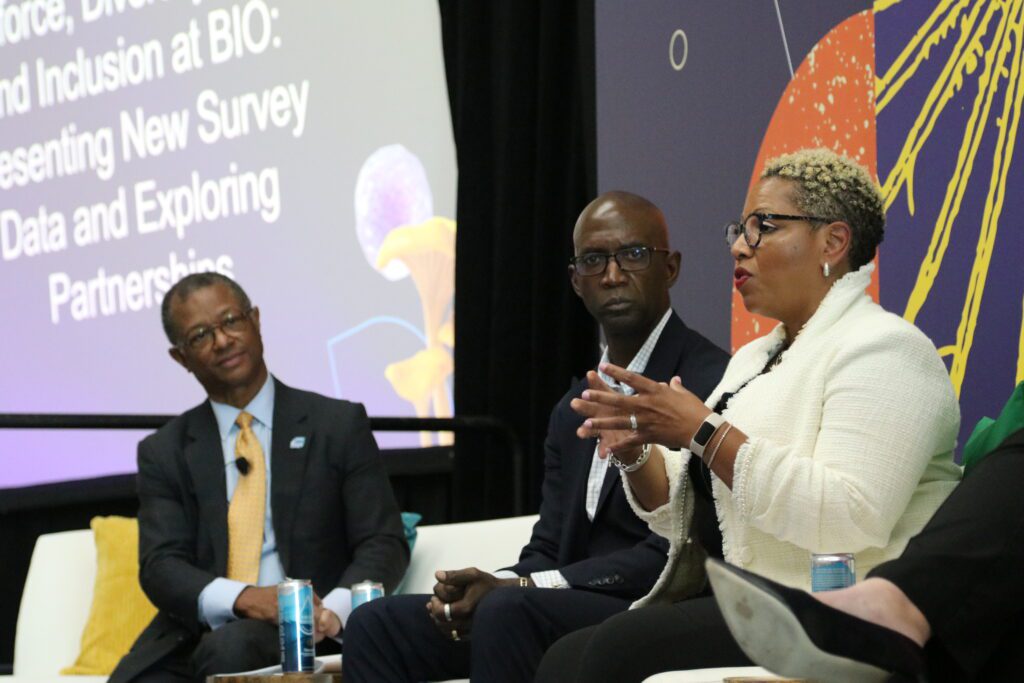The Biotechnology Innovation Organization (BIO), in partnership with Korn Ferry, released the 2024 DEI report, Charting a Path to Inclusive Excellence for Biotechnology Companies, on Day 2 of the BIO 2024 International Convention.
“The vast majority (85%) of participating organizations rate DEI as an ‘Important,’ ‘Very Important,’ or ‘Critical’ area of strategic focus,” according to a BIO press release. The results indicate biotech companies understand that DEI efforts are not only an important tool for employee recruitment and retention, but also that such initiatives can also save lives in the long run.
Yet, it is undeniable that work remains.
Watch Mike Edmondson, U.S. VP of Performance Optimization at Amgen, describe the company’s approach to DEI:
How DEI initiatives impact employee retention
“The number one reason across the world that LGBTQ people don’t come out of work is the fear of making others uncomfortable,” cited Jane Barry-Moran, Managing Director of Programs & Research at Out Leadership, speaking during a panel at the event.
“When we query the women who came to [the WoCIP] conference last year,” recalled Charlotte Jones-Burton, M.D., MS, founder of Women of Color in Pharma (WoCIP), “9 out of 10 said they have experienced a microaggression within the past 12 months.”
BIO Chair Dr. Ted W. Love observed historic missteps in the academic and professional realms in the 1980s where, even though Black students and professionals were brought into an environment, they were not encouraged to embody their identities while inside of those environments. This led to poor retention and burnout.
Such dynamics often lead to a phenomenon called “covering,” where employees from diverse backgrounds hide their inherited traits. This zaps productivity and decreases retention.
When Dr. Jones-Burton founded WoCIP, it was in the spirit of bringing together women of color to solve the historic DEI issues they faced firsthand.
“What we were experiencing was that we were underrepresented,” explained Dr. Jones-Burton. “We didn’t have people who were pouring into us and helping us understand the business so that we could then connect the dots. So we figured we could do it, that we could create the future that we wanted to have, and it was all so that we could advance equity.”
BIO’s 2024 DEI report also seemed to reflect these challenges and the work done to overcome them.
DEI numbers improve, but slowly

The survey showed a near 50/50 split between men and women employed at any given company. However, “Men continue to occupy a larger share of senior positions while women comprise 40% of executives, 29% of Board members, and 22% of CEOs.”
Yet, these numbers are an improvement on the numbers from BIO’s 2022 DEI report which found that only 34% of executives were women and just 20% of CEOs were women.
The numbers did not improve when it came to race or ethnicity representation. While the number of POC employees at member companies sat at around 40% of those employed, on average, employees of color comprised “30% of executives, 22% of Board members, and 14% of CEOs,” the report found.
Lastly, regarding the LGBTQ+ metric, the report had fewer numbers to analyze, with only 21% of participating companies (16 total) reporting collecting information on LGBTQ+ identifications of employees.
“Within these 16 organizations,” the report states, “people who identify as members of the LGBTQ+ community comprise less than 1% of executives and all employees. Notably, however, these percentages may understate overall LGBTQ+ representation to the extent that employees declined to disclose their identifications to their employers.”
Systemic change for the future of biotech
Whether it is promoting buy-in to DEI measures across the company, or setting an inclusive “tone from the top,” as Dr. Love pointed out on the panel, biotech companies are working to improve their numbers.
But when it comes to company and investor buy-in to DEI measures, there was one refrain that reverberated throughout various panels: diversity and inclusion is good for business.
“A lot of DEI conversations start with organizations doubling down on articulating a rationale that connects DEI measures with that fact that they are something that’s driven by more than just values, or a particular ideology, or even belief that this is the right thing to do,” noted Mark Royal, Ph.D., Senior Client Partner at Korn Ferry. “We’re doing this because it benefits the organization and creates a better work environment for everyone working there. And I think to the extent that organizations can continually reinforce those messages, they have opportunities to bring people around.”
“Wellness is so critical, and it’s important that people feel that they belong and ensure that they have psychological safety,” added Dr. Jones-Burton.
The recommendations
While the 2024 DEI report is comprehensive, the recommendations balance on four cornerstones:
- Inclusive leadership
- Behavioral inclusion
- Structural inclusion
- Change management
As these four cornerstones exemplify, change and DEI development need to happen at every level and be facilitated through cultural and structural changes in a company or organization.
Companies need more diverse leadership, which can continue or initiate compliance initiatives to improve company culture and hold it accountable to the new standards. Systemic biases need to be addressed by conducting things like company-wide equity audits, as well as collecting employee demographic information that can help a company analyze whether or not the numbers reflect new priorities.
Goals and progress need to be revisited on a regular basis to ensure leadership. Additionally, the company as a whole are aligned to fundamentally change and improve the company in the long term.
“Effective change management helps ensure that interventions implemented will truly drive behavioral and structural changes,” says BIO. “Senior leaders need to be aligned and fully accountable for the change strategy and its implementation every step of the way.”
The panelists were stalwart in their commitment to continuing to make biotech more inclusive and considerate. “We will all live through these acronyms,” said Barry-Moran. “I think that it comes back to the fact that DEI is good for business. Businesses know it’s good for business, especially when we are working with our global clients.”
“As long as we stay focused on the outcome, that will guide our actions,” concluded Dr. Jones-Burton. “We’re all here to discover, develop, and deliver innovative medicines and other things in terms of health for all patients.”
“Our differences actually lead to better science, better business results, and better outcomes for our patients that we serve,” said Amgen’s Edmondson.



